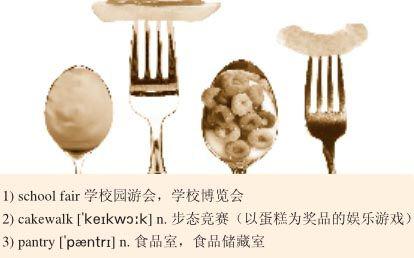胖娃辛酸史:我的胖,谁的错?
2013-12-09byAutumnWhitefield-Madrano
by Autumn Whitefield-Madrano



I was a fat kid. I havent written about this before because being a fat kid hurt me then. And having been a fat kid hurts me now.
Things I remember about being fat: Not being able to wear jeans (there was no such thing as jeans for fat girls in 1983). Not wanting to participate in any games at the 1)school fair except the 2)cakewalk. Faking sick on the day we were supposed to do height-weight testing, only to find out that it had been postponed a day. Pretending to twist my ankle at age 7 in the 50-yard dash to spare myself the embarrassment of being the fat kid who came in last; doing the same at age 8, and 11. Stealing bags of brown sugar from the 3)pantry to eat in my bedroom, alone; denying to my mother that Id done so, even when it was clear she knew I had.
There is a theme here: absence, and 4)falsity. I couldnt wear jeans; I didnt want to play games that wouldnt get me cake; I faked sick; I pretended to twist my ankle; and I denied secret eating. Being a fat child wasnt so much about the fact of being fat as it was about couldnt, wouldnt, shouldnt. There is a counter-theme too: Love—of food, exquisite food, food, füd, phood, food, the 5)panacea to whatever 6)free-floating stresses there were in my life as an intellectually mature but emotionally not-so-mature 8-yearold girl. I didnt have a difficult childhood by any means, but it was a childhood; it came with bumps and dents and scratches that I didnt really know how to handle. Lucky for me, I didnt have to learn, because I had food right there, every day, making it all okay. It worked—until it didnt, but thats not the story Im trying to tell here. Food felt like it worked, and in a childs mind, thats enough.
When I look at my own experience as a fat kid, I dont see a problem with society, or cruel children, or unlimited soda refills. I see a problem with—how do I put this without appearing to be swatting the wrist of my 8-year-old self?—I see a problem with me, and with the way I understood my size. There was very little fat-shaming in my life, but I still felt like being fat was wrong, bad, unfeminine, shameful—all those things fat activists say are 7)erroneously attached to weight. Theyre right to say that; those feelings should be separate from weight. Yet they werent separate, not for me. I filtered any feeling I had—about my fatness or anything else—through food, and my chronic overeating was what kept me fat. My feelings were my fatness; my fatness, feelings. I wouldnt have been better off had I been basically bullied into losing weight, or into feeling worse about being fat. But I certainly would have been better off if I werent fat.
Id also had been better off if the world around me didnt 8)disperse shame upon overweight people—had my grandmother not told me I was “too big,”had my classmate remained 9)nonchalant whatever the number on my height-weight card, had my neighbor not 10)insinuated I could single-handedly 11)topple over a trailer designed for far greater stress than a fourth-graders frame. The world needs to change in its attitude toward fat people, and that is unquestionable. And yes, I wish the world around me had been different. But I wish Id been different too.
Being a fat kid wasnt easy. I wasnt teased or bullied, and few people ever tried to make me feel like I was lesserthan because my body was more-than. The problem went much deeper than that. The problem—to a point—was me.
The emphasis on childhood obesity is a convenient 12)scapegoat for the deeply conflicted relationship that pretty much our whole society has with food, comfort, bodies, and conformity. And we as a society have a responsibility to not only take a cold, hard look at that relationship for our own benefit, but, yes, “for the children.” We need to help children on a physical, mental, emotional, and sociological level be as healthy as possible. And sometimes being as healthy as possible includes losing weight. Im not a public health expert, Im not a psychologist. I dont know how to help children reconcile the 13)ostensibly dueling messages of“You are good just the way you are”and “You might be better off if you took certain steps that will make you healthier—and, as it happens slimmer”. I just know that we need to.
Nobody should be made to feel bad because of how they look, or because of the size their body takes up in the world. But not all fat-phobia comes from outer sources. Yes, Im tired of the idea that weight loss is 14)unequivocally a good thing; I loathe the 15)bumper-sticker wisdom that inside every fat person theres a thin person waiting to get out. Nobody wins when we assume fat people must be unhappy. That doesnt mean that there arent fat people—including children—whose size makes them unhappy, and who dont have a vocabulary for 16)articulating that unhappiness without falling down the rabbit hole of self-loathing. Had I such language as a child, I might have found more satisfaction from what came out of my mouth than what went into it.
我曾经是个胖娃。以前我从未写过这番经历,因为那时“是个胖娃”让我很受伤。而曾经是个胖娃,如今亦让我心伤。
我记得肥胖时的那么一些事情:不能穿牛仔裤(在1983年,根本没有给胖妞穿的牛仔裤)。不想参加学校游园会里的任何游戏,除非是步态竞赛。在要测量身高体重的日子假装生病,却不料测量日子推迟了一天。七岁时在50码短跑中假装扭伤脚踝,以免落得成为“跑最后的胖子”的尴尬;然后在八岁和十一岁时故伎重演。从食杂柜里偷出袋装红糖,藏在卧室里独吃。在妈妈面前极力否认自己的行径,即便我明知她是知道实情的。
这其中有一个主题:缺席和谎言。我不能穿牛仔裤;我不玩没有蛋糕作为奖励的游戏;我佯装生病;我假装扭伤脚踝;我还否认偷吃。作为一个胖娃,其实跟“胖”没多大关系,而是关乎不能、不愿意和不应该。这其中也有一个与前者相对立的主题:热爱——热爱食物、精致的食物、食物、食物、食物、食物,那是灵丹妙药——为我这个智力成熟但情绪不太成熟的八岁女孩排除人生中一切飘忽压力的灵药。我的童年怎么说也不算艰难,但那确实是童年时光,也会有一些我真的无法处理的磕磕碰碰、坑坑洼洼和小擦小伤。我很幸运,我不必去费心领悟教训,因为我每一天都拥有食物,一切都不是问题。食物很有效——直到其最终失效,不过这不是我要说的故事。在一个小孩子看来,食物让人觉得有效,这就足够了。
当我回首以前那些“肥胖的日子”时,我不觉得这社会有什么毛病、也不觉得捣蛋欺人的孩子或者无限次汽水续杯是多严重的问题。我只看到一个问题——我该怎么说才不会看起来像给八岁的自己手腕上一记重击?——我看到了自己的问题,关于我怎么看待我的身形的问题。我的一生中几乎没有因为长得胖而觉得羞耻,可是我至今仍然觉得长得胖不对,很糟糕,缺乏女人味,也可耻——肥胖激进分子认为是错加于体重问题的那些东西。他们这么说是对的;那些情感应该与体重分开。但是这两者并非互不相干,至少在我身上不是那样。我会通过食物对我所有的情感——关于我的肥胖或者其他方面——进行过滤,而我长期过量进食是导致我肥胖的原因。我的情感就是我的肥胖;而我的肥胖就是我的情感。说实在的,如果我被强制减肥,或者被迫认为当一名胖妞很糟糕,我不会幸福。不过,如果我不曾是一个胖娃,我肯定会过得更好。
如果我周围的世界不给超重人群渲染上羞耻的色彩,我也会过得更好——如果我的祖母没有说我“块头太大”,如果我的同班同学对我身高体重卡上的数字漠不关心,如果我的邻居不再含沙射影地说我一手便可以推翻那种承重能力远远超出一个四年级学生体格的货柜拖车。这个世界需要改变其对肥胖人群的态度,这是毋庸置疑的。是的,我希望以前我周围的世界能有所不同。不过我也希望过去的我非彼时的模样。
当一个胖小孩不容易。我没有受到嘲笑或欺凌,几乎没有人会因为我的身体“卓卓有余”而做些什么让我觉得自己“不足”。问题的层次要深得多。问题——从某种程度上来说——在于我自己。
我们整个社会在美食、慰藉、体型和从众心理这些问题上,立场态度总是矛盾重重,儿童痴肥现象轻易便成为众矢之的。而我们作为一个社会群体,有责任冷静、认真地看待这种关系,既是出于我们自己的利益,也是,“为了孩子们着想”。我们需要帮助孩子们在身体上、精神上、情绪上和心理上获得尽可能健康的成长。有时,尽可能的健康成长也包括了减肥。我不是一个公共卫生专家,我也不是一个心理学家。我不懂得如何帮助孩子们权衡这两个表面上对立的信息:“做回自己就很好”和“如果你能采取某些行动让自己更健康,也许你会过得更好,而且随之而来的是更为苗条的身材”。我只知道,我们需要这么做。
没有人应该为自己的外表或体型感到难过。然而,不是所有的肥胖恐惧都来自于外因。是的,我已经厌倦了“减肥是明摆着有益的事”这一说法;我讨厌那些车尾贴警句——“每一个胖子的体内都藏着一个呼之欲出的瘦子”。以为肥胖人群一定过得不开心的这种心态,对谁都没好处。但那不意味着没有不因自己体型而苦闷难过的胖人(包括儿童),也不意味着没有因胖愁难言而掉入自憎自弃深渊里的胖人。如果我小时候就拥有那样的语言能力,也许我从说出的话中获得的满足会比吃进去的更多。
